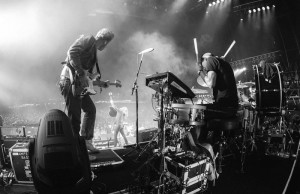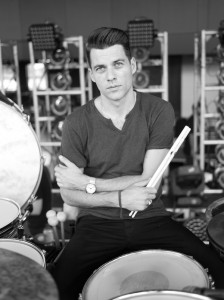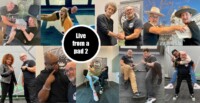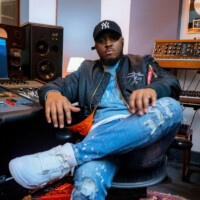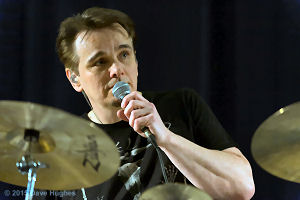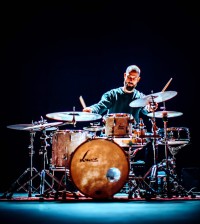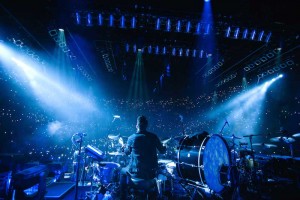 Born and bred in Luxembourg, Chris Maas’ decision for a life as a pro musician came at a very young age. His dads support, his years of learning at the musical conservatory, and finally his move to London, paved the way to the big stages, and quickly raised Chris’s profile on the UK drum scene.
Born and bred in Luxembourg, Chris Maas’ decision for a life as a pro musician came at a very young age. His dads support, his years of learning at the musical conservatory, and finally his move to London, paved the way to the big stages, and quickly raised Chris’s profile on the UK drum scene.
Having worked for the likes of Matt Corby, Example and The Pierces (just to name a few), Maas has experienced the whole spectrum of the music industry but still hasn’t lost his hunger for working with as many artists – whether established or up and coming – as possible.
With their change in musical direction in 2014, Chris joined UK folk rock band Mumford & Sons as their touring drummer – which has kept him busy ever since…
You grew up in Luxembourg. Are instrumental lessons provided at school there or where did you learn?
It’s completely outside. Firstly my dad was a big influence. He played drums in a brass band. Not professionally, but he would go and do gigs on the weekends. I remember when I was five or six I was allowed to stay up late and go to rehearsals with him once every couple of months. That was the most exciting thing I’d ever seen. I guess that’s where it started.
I don’t have any siblings so my dad was always my hero, we would hang out a lot and he was my best mate. He saw that I wanted to be like him and every now and again he would bring his drum kit home, set it up in the garage and teach me a couple of things.
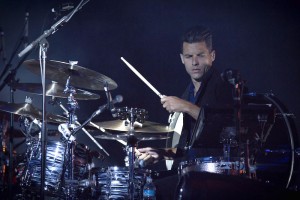 Eventually he got me a proper drum tutor and also insisted I’d learn music theory, harmony, singing, piano – which I’m now incredibly thankful for. I had to go for two hours theory lessons a week and as a pay off got to play drums at the end of the week. My dad never had lessons. He had to teach himself so he wasn’t an incredible drummer. He always said that if I really wanted to learn he wanted to encourage and support me to become the best drummer I could be.
Eventually he got me a proper drum tutor and also insisted I’d learn music theory, harmony, singing, piano – which I’m now incredibly thankful for. I had to go for two hours theory lessons a week and as a pay off got to play drums at the end of the week. My dad never had lessons. He had to teach himself so he wasn’t an incredible drummer. He always said that if I really wanted to learn he wanted to encourage and support me to become the best drummer I could be.
Later I went to a really good state music school that has different branches around Luxembourg. You can do your music grades there up to a certain level; then you have to transfer to the conservatory of Luxembourg. That’s where you properly get into it. I had lessons there twice a week for nine years and finished all the exams there.
Has jazz always been a passion of yours?
I didn’t really listen to jazz as a kid. My mentor tried to get me onto jazz players but I just thought: why would you listen to Buddy Rich if you could listen to John Bonham?! In my head that didn’t make sense. Obviously the more I learned about my instrument and once I started to understand how good the Greats (Max Roach, Tony Williams, Elvin Jones) actually were, to me over time jazz just became more and more appealing – to the point where I thought jazz is incredible and I wanted to learn how to play it. That didn’t really happen until I left Luxembourg. Nowadays even though I never play it anymore, most of the music I listen to, is jazz. The whole history in the jazz back catalogue is so fascinating to me. The gems you find! It’s almost insatiable history of music that is there for you to find – especially with the internet. You can never listen to it all – but you can try.
Is that where your passion for vintage gear comes from?
Oh yes, definitely. I’m a big gear head. I love geeking out about drums and I love vintage drums much more than I love new drums. There are some little companies coming out with some incredible handcrafted stuff in the UK as well as America and that’s great but to me… it’s the same with music really: the old records and the way they were made. Everyone played together in one room and this magic was created in the moment. You had one, two or three takes till your tape ran out. That to me was the magic I was looking for.
With drums, back in the day they were crafted in a different way and I just connect to it more. When you play an older drum it feels like there is history in it and it sounds different – to me anyway. A lot of people might think it’s bullsh*t. To me, depending on what drum I play, my playing changes. It really inspires me.
My mentor at the conservatory told me I had two options. Option A was to stay in Luxembourg and become a teacher. I do want to become a teacher at some point but I was 20 at the time, had just finished all this school and had never really played big gigs, hadn’t traveled; so I felt like I didn’t have enough knowledge to pass on yet. Yes I could have taught technique and drums as such but what I enjoyed most from my mentor was that a lot of the teaching was verbal. In two hours we would do one hour of playing and one hour of talking. I feel that a big part of the knowledge he passed on to me was from telling me stories about what he used to do, the places he would visit with different bands and that’s what made me wanna go and do that too. I felt like i needed to do that and accomplish something first before I started teaching.
So I took option B, which was moving abroad. My dream was to go to Berklee but it’s really hard to get a scholarship in Luxembourg, so I had to look for somewhere else. I found two schools in London, two in Germany and one in France. A friend of mine from back home wanted to study the same thing and seeing as London is the heartbeat of the music scene in Europe, we agreed to go to London together. To this day I haven’t regretted my decision. Everything happens for a reason.
So you went to university in London?
I enrolled at Tech Music School in Acton because I wanted to study popular music and play big shows with big artists, I didn’t want to become a jazz drummer. I did two years there, made some really good friends, had amazing teachers and learned a lot. During that second year I started getting my first tours and took some time off school. I did all my final exams of that second year but because I had been so busy in the weeks leading up to it, I decided to take a year off.
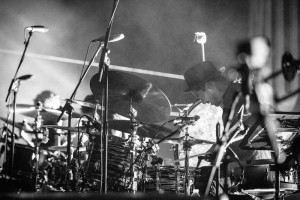 The first year went quite well; the year after didn’t go well at all because I learned the hard way that you can’t really live off past tours. I was getting used to the fact that this in line of work there are many peaks and troughs. One moment you’re playing a really big show and then the next moment you can be sitting next to the phone, wondering why nobody is calling. As long as you’re away you’re having fun, you’re playing drums, you’re having the time of your life! The toughest part of this job is getting yourself through the time you’re not working.
The first year went quite well; the year after didn’t go well at all because I learned the hard way that you can’t really live off past tours. I was getting used to the fact that this in line of work there are many peaks and troughs. One moment you’re playing a really big show and then the next moment you can be sitting next to the phone, wondering why nobody is calling. As long as you’re away you’re having fun, you’re playing drums, you’re having the time of your life! The toughest part of this job is getting yourself through the time you’re not working.
That’s what I had to learn: to not get frustrated, not to get down. Because by getting down you’re kind of keeping the work away as well. If you just stay positive and you keep working, practising and going out meeting people, work will come to you.
Even nowadays: the last five/six years of my life have been incredible and I pretty much had constant work but I don’t know what’s coming. Next year could be a slow year and I might not have a lot of stuff coming in. You just gotta make hay while the sun shines and enjoy it day by day. Be thankful every day you’re out there playing a gig, whether it’s in front of 20 people or 20,000. As long as you’re thankful of the opportunities you’re given, the more of those opportunities will come your way.
Where did it go from there? What was the first ‘pro’ gig?
The first pro gig was a gig I actually went back to almost ten years later in my life: Example. I did an audition for that in 2007 and toured with him until the end of 2008. Back then he was on a label that was owned by Mike Skinner from ‘The Streets’ so we used to do a lot of touring with them and Professor Green. They had a really cool little group going that went on tour together. We did some headline gigs with Example too but they weren’t massive shows at that point.
I finished that gig at the end of 2008 and went on to have that one go at having my own band. That went really well for a while as well and we did lots of tours, in the whole ‘splitter van up and down the country’ thing. From Inverness down to Portsmouth, every small town, every little venue, staying at friends houses sleeping on the floor – it was great.
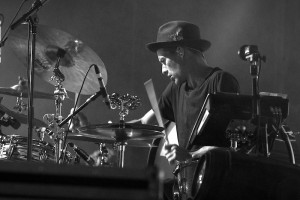 I call that the grind because that’s where you learn very quickly whether you’re made for this job or not. I always say it only gets easier. The higher up you go, suddenly you’re not staying on the floor, you’re staying at the Travelodge; then you’re not in the splitter van anymore but on a tour bus; It just keeps going and going until you have a tech, you’re drums are always there and set up for you, someone is there to take them down so you don’t have to do it and you’re being flown to gig.
I call that the grind because that’s where you learn very quickly whether you’re made for this job or not. I always say it only gets easier. The higher up you go, suddenly you’re not staying on the floor, you’re staying at the Travelodge; then you’re not in the splitter van anymore but on a tour bus; It just keeps going and going until you have a tech, you’re drums are always there and set up for you, someone is there to take them down so you don’t have to do it and you’re being flown to gig.
Having seen the whole spectrum of it, I can definitely say it only gets easier. When you start out, that’s when you really have to work hard every day. Where as now, I’m not saying I’m not working hard, but a lot of perks come with playing bigger shows. I have the most incredible tech in the world and feel part of a team now, so things become easier.
Talking about big gigs: your main gig currently is Mumford & Sons. How did that come about?
Yes, I’ve known the boys for a long time. I had done some touring with them back in 2011 because Marcus had broken his right hand and had it in a cast. That was at the time when the second album ‘Babel’ was released and they had a massive European festival tour announced. They called me up and asked me to come for a meeting. They went: “Listen, Marcus has broken his hand, we have six weeks of festivals coming up, we need you to play drums”. Of course I said yes. I managed to clear my schedule, went on tour with them for the whole run but only playing the songs Marcus was playing drums on – which was three songs. So I went on tour for six weeks playing three songs a night. [laughs]
It was incredible! Those were the biggest shows I’ve ever played but I never went up to people saying “Hey, I’m playing with Mumford & Sons” because I knew I was just helping out a friend. After that I went back to joining the other gig I was on at the time.
Fast forward to the end of 2014 (basically three years later) I was hanging out with Ted the bass player and he told me how they were recording the new album and how well it was going. He told me that there were a lot of drums on it, like proper kit, and I just asked him how they were gonna do it live. They hadn’t talked about it properly at the time but I said: “I’m not gonna put myself forward here, but you know that I would love to do the gig!”. He told me there were about five names of drummers mentioned but no decisions had been made. I was out with Example at the time and we were doing big shows. I was having the best time with him, so I wasn’t even looking for a gig. One day their management company called me and said the boys had made a decision and would like to offer the gig to me. Of course I agreed straight away. That was in December 2014 and they wanted to start the following February. The problem was that I already had an Australia tour booked in with Example for that February/March.
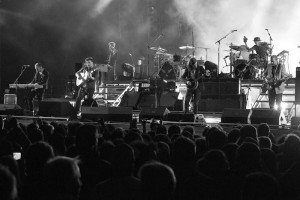 I just had to take the gig though, it’s a once in a lifetime opportunity. At the same time I’m not one to let people down . Elliot (Example) is a good friend of mine so it was a tough week of not sleeping much and trying to work out the logistics without pissing anyone off. Thankfully the Mumford boys where very helpful, patient and accommodating with my schedule because they understood that I didn’t want to burn any bridges. Same with Examples team. I managed to put people in place to cover for me and then eventually leave the gig. Especially Elliot himself was very supportive and I can’t thank him enough for that.
I just had to take the gig though, it’s a once in a lifetime opportunity. At the same time I’m not one to let people down . Elliot (Example) is a good friend of mine so it was a tough week of not sleeping much and trying to work out the logistics without pissing anyone off. Thankfully the Mumford boys where very helpful, patient and accommodating with my schedule because they understood that I didn’t want to burn any bridges. Same with Examples team. I managed to put people in place to cover for me and then eventually leave the gig. Especially Elliot himself was very supportive and I can’t thank him enough for that.
That was it, I was in. Rehearsal started in February 2015, we started gigging in April and we’re pretty much about to wrap this campaign up now. It’s been an incredible three years.
Is it sometimes hard to satisfy seeing as Marcus is a drummer himself?
They can all play drums so that’s a very good question actually. It was weird at first I have to say, but only because I wasn’t used to it. All the gigs beforehand, people would come up to me and go like “Right for this song we’re kind of thinking like a mix of Coldplay meets Beach Boys meets Coltrane” and you’re sitting there thinking what the hell is he talking about?! On this gig it’s much easier because Marcus explains stuff to me. If I then have no idea he would just go “Ok, move over”, he’ll sit on the kit and just play it. He’s an incredible drummer.
Ben, the keys player, can play drums; they can all play drums – which is awesome. There is actually one song where I play double drums with Ted the bass player and he is actually leading the tune.
I was just about to mention this: there are two drum kits on stage for your show. Marcus drums on some tunes while you’re off stage; later you’re back on…
The first two records (‘Sigh No More’ and ‘Babel’) between them maybe had four or five songs with drums on them. Every other track had the signature Mumford & Sons kick drum and tambourine, which Marcus plays at the front of the stage while playing guitar. Now, even though we have reworked a couple of the classic tunes to have drums on them, a lot of the old tunes still only have that kick and tambourine pulse, so there is no need for me to be on stage.
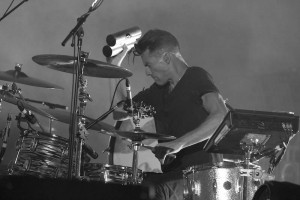 The setlist can change a lot of the times so there might be one gig where I play 16 songs out of 20 – but there might also be one set list where I’ll play 10 or 12 tracks out of 20.
The setlist can change a lot of the times so there might be one gig where I play 16 songs out of 20 – but there might also be one set list where I’ll play 10 or 12 tracks out of 20.
Depending on the running order I might have one song on, one song off, two songs on, one song off..you know. At first I found that quite disruptive because you can never really get into a groove but I saw it as a challenge and I feel like I’ve really grown into it. You do whatever the music asks for, there is no point of me playing drums on a tune that doesn’t need drums.
Photography is a big hobby of yours.
Yes, I absolutely love photography! It kind of started the same way drums did, as a past-time. Because I made drumming my job, I then lacked a hobby. I woke up on tour one day and thought: “What should I do today?”. If you have a day off on tour there are very few things you can do – especially when you’re on a bus. The normal thing to do is going into the nearest town and just explore and find some good restaurants and coffee shops. One day I saw the bass player from Mumford & Sons with a camera taking photos. I had never seen one like that and he told me it was a film camera from 19-I-don’t-know-when. He let me take some photos and eventually gave me an old camera of his. A really simple 35mm film camera – which I still have – and that was me. From then on we would go exploring and taking pictures together. That was back on the tour where Marcus had broken his hand. After that it just became more and more and I started obsessing about the gear, geeking out on all the different cameras but now I’ve calmed down a lot. I’ve sold a lot of cameras and just have the ones I would call ‘necessary’ – same like with drums really. I do have digital cameras now but film is still my passion.
We’re just finishing the last lot of shows and after that touring with Mumford & Sons is done for the year.
It all depends after that, I don’t like to plan too far ahead, usually as a session drummer you can’t. I’m planning on working on a couple of records in November and December and will hopefully be doing some touring too. Next year potentially a new Mumford record? But I don’t know… maybe something completely different.
The fun for me in this job is the fact that it’s so diverse and you never know what’s around the corner. It keeps you on your toes and keeps you from becoming complacent. There are so many alleys that my life could go down next and you just have to be prepared for whatever comes your way. There are some photography plans with exhibitions and stuff that I’m working on as well but there are no plans set in stone. I’m just excited to see what’s coming up.
Thanks a lot for your time Chris!
Interview by Tobias Miorin
November 2017

